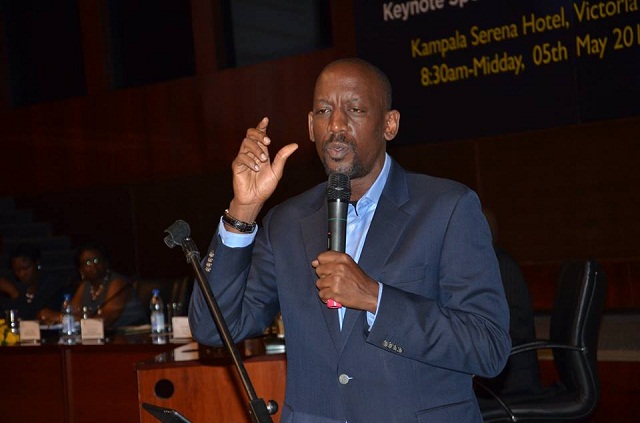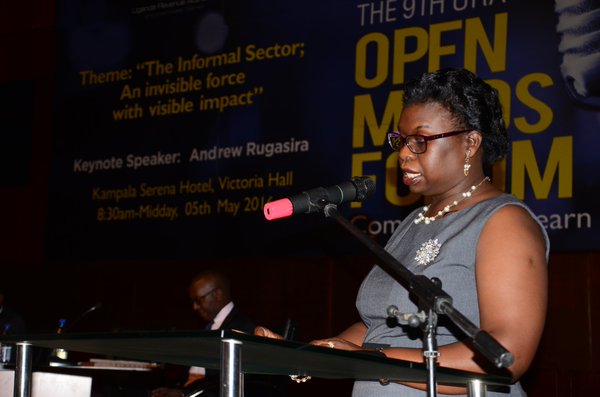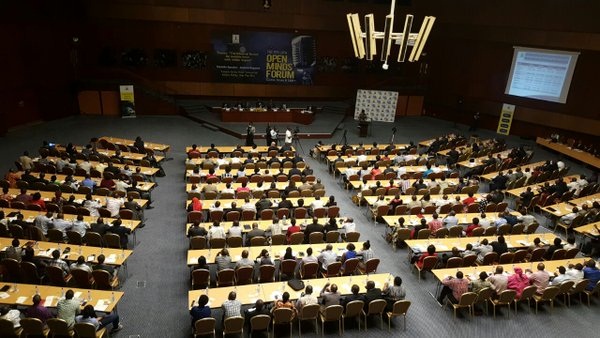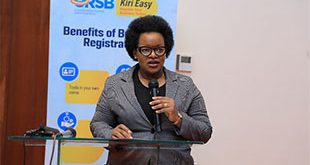
Andrew Rugasira has warned that the difficulty in registering businesses in Uganda causes preference by many for informality in the economy.
He said the entrepreneurial spirit is present among many Ugandans, but is undermined by many unnecessary obstacles, including that it takes up to 27 days to register a business. Rugasira remarked that while Uganda was voted one of the most entrepreneurial countries in the world, there was an absence of an environment to make business thrive and comptitive.
An official of the Uganda Registrations Services Bureau (URSB) however jumped in during the lively Open Forum, reassuring the audience that URSB, the body that registers businesses, is able to register a business in under 48 hours.
The day’s theme, “The informal sector – An Invisible Force With Visible Impact” was chosen because of URA’s concern that in spite of key players in the Informal Sector “swimming in profits, their contribution to nation development through revenue is small.”
Muvawala: Dealing with the informal sector must be a strategic choice by govt. It must be based on incentives given by govt @mofpedU #OMF16
— Stella L M Ahaabwa (@ms_ahaabwa) May 5, 2016
Rugasira, proprietor of Good African Coffee, was the keynote speaker today at the 9th Open Minds Forum organised by the Uganda Revenue Authority.
To stress how important the informal sector is to drives for growth in Uganda’s economy, Rugasira revealed that up to 400,000 enter the job market annually in Uganda, but there are only 9,000 formal job places available.
“Difficultly in registering businesses causes informality to thrive. Let’s not look at the Informal Sector as a problem, but look and create opportunities to turn the players there to formal business,” he said.
Earlier, the Commissioner General of URA Doris Akol revealed that up to 80% of Uganda’s labour force is in the informal sector. She mentioned Agriculture as one area with a lot of potential to add to revenue and good business culture in Uganda.
She said Uganda’s tax to Gross Domestic Product (GDP) ratio is the lowest in region. “We need to increase the tax base,” she explained.
@URAuganda @andrewrugasira @URA_CG shout out to the amazing panelists at the Open Minds Forum. Well selected #OMF16 pic.twitter.com/335gNrbdxS
— Stella L M Ahaabwa (@ms_ahaabwa) May 5, 2016
Pre-event, URA Manager Public & Corporate Affairs Ian Rumanyika stated that the informal sector ought to increase its contribution to lessen the burden on the registered taxpayers.
“It is not only about us getting tax from the sector but when players formalize their businesses, it will reduce unfair competition. Informal sector enterprises currently cannot do business with the government that is why we want them to be formalized,” said Rumanyika.
The presentations were followed by passionate and at times heated discussions on how best to improve Uganda’s revenue base.
Rugasira urged the audience and URA to look at the debates positively, saying “change starts with a conversation.”
Panelists were Dr. Joseph Muvawala Executive Director National Planning Authority and Private Sector Foundation Uganda Executive Director, Gideon Badagawa.
Other speakers were Kampala City Traders Association chairman, Evaristo Kayondo and the proprietor of Kazaire Health Products, Edward Kazaire.
“You are demanding more districts, more tarmacked roads but who will provide these things if you don’t pay your taxes. The bad news is that the grants you have been crying for are dwindling at a speed unimaginable,” Muvawala told the audience.
According to URA, “OMF was initiated in 2008 with an objective of empowering stakeholders with knowledge on topical issues and promotion of stakeholder interaction. Other objectives are generating feedback with view of improving services offered, discussing current programmes and discovering different ways of approaching initiatives or concern. ”
“Additionally, the fora is premised on providing an opportunity for public participation in policy formulation/review and aiding public expression/community perspectives on various issues,” URA said.
“Past fora have discussed trade facilitation, education and regional integration. Other topics were widening of the tax base, leadership and nation building, child trafficking and abuse and the potential of Uganda’s vast oil resources.”


 The Independent Uganda: You get the Truth we Pay the Price
The Independent Uganda: You get the Truth we Pay the Price


